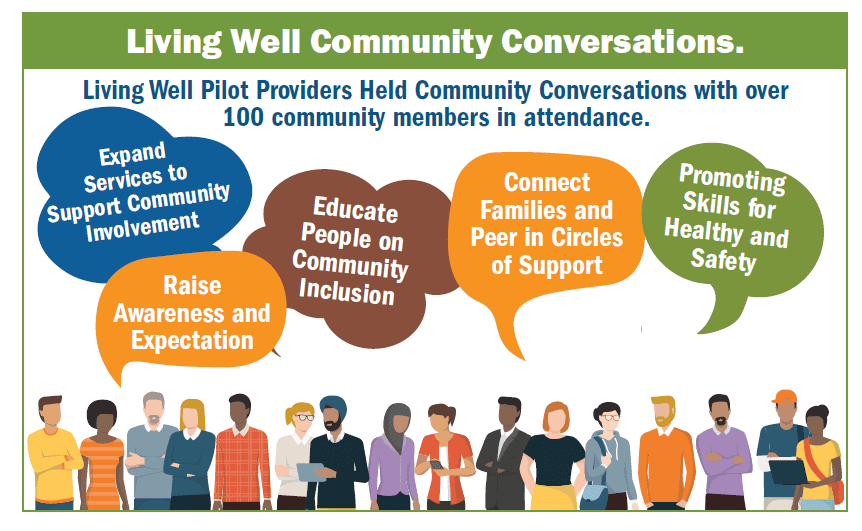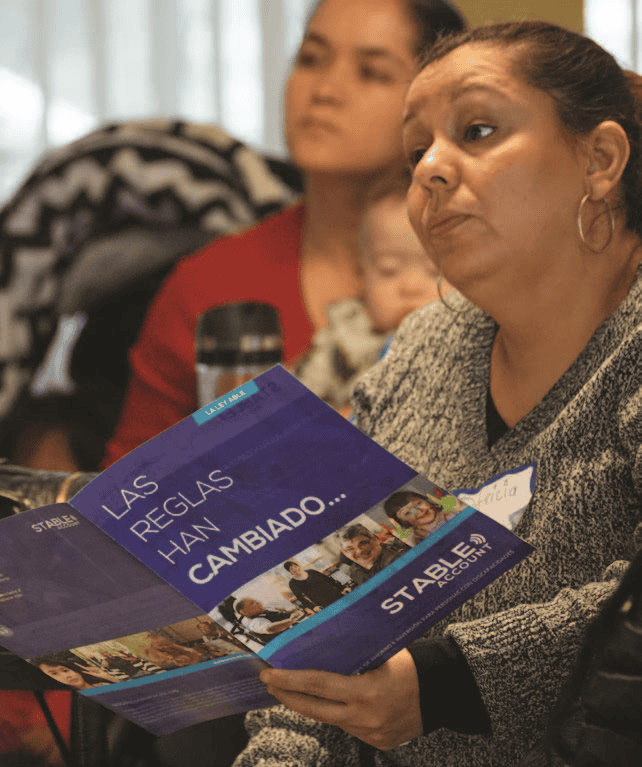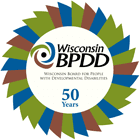Building Community Relationships:
Agencies
Why Building Community Relationships Matters to Agencies
Building community relationships is a critical component of agency operations, particularly when it concerns individuals with disabilities and their families. It is
essential for ensuring that plans and services effectively improve the lives of people with disabilities. Community relationships involves active communication and collaboration with self-advocates and all parties involved in the lives of individuals with disabilities, including their families, caregivers, and policymakers. Agencies must recognize the importance of involving all community members to make informed decisions and create policies that truly meet the needs of those they serve.
The Living Well grant goal was to increase the ability for all community members to self-assess, monitor, report, reduce and or remediate situations and environments for health, safety and quality of life. These goals were based on improved coordination among statewide partners; increased capacity of all community members to self-assess and monitor health and safety; increased implementation of evidence-based practices and community monitoring; and, increased healthy safety, independence and well-being of people.
In the Living Well grant, the team used multiple ways to engage with the pilot agencies. These included the use of a learning collaborative, a consortium group, quarterly action planning meetings, and training to improve quality services. In turn, we asked agencies to consider how they could also engage stakeholders within their own communities to help build greater acceptance and awareness of people with disabilities living and working in their communities.
How Agencies Can Build Community Relationships
Ensuring Person-Centered Services: Home and community-based waiver agencies primarily serve individuals with disabilities, older adults, and individuals with chronic illnesses who require long-term care and support. Engaging community members, including the individuals and their families, in decision-making processes ensures that services are tailored to meet the specific needs and preferences of the individuals receiving care. This person-centered approach leads to better outcomes and a higher quality of life for the beneficiaries.
Quality Improvement: Regularly seeking input and feedback from community members allows agencies to identify areas for improvement in their services. This feedback loop helps agencies refine their care plans, procedures, and service delivery methods, ultimately leading to higher-quality care.
Program Development and Innovation: Community relationships can provide valuable insights into emerging needs, trends, and best practices in the field of home and community-based care. Agencies that actively involve community members are better able to adapt their programs and services to changing circumstances and to incorporate innovative approaches.
Transparency and Accountability: Community relationships fosters transparency in agency operations and decision-making. People with disabilities, families, and community members who are part of the engagement process can hold agencies accountable for their actions, promoting trust and integrity in the delivery of care.
Conflict Resolution: In cases where conflicts or disagreements arise between people with disabilities, families, and the agency, a structured community engagement process can help facilitate communication, find common ground, and reach mutually acceptable solutions.
Cultural Competency: Understanding and respecting the cultural, linguistic, and social backgrounds of people in the group is essential in providing culturally competent care. Building community relationships helps agencies gain insights into the diverse needs and perspectives of the people they support, enabling them to provide more inclusive and effective services.
Long-Term Sustainability: By involving community members in the agency’s decision-making processes, home and community-based waiver agencies can build stronger relationships and foster a sense of ownership and investment among communities. This, in turn, can contribute to the long-term sustainability and success of the agency.
Tools for Agencies
Surveys and Questionnaires- Agencies can use surveys and questionnaires
to gather feedback from individuals, their families, caregivers, and community
members about a particular topic. These surveys can be used to help guide
strategic planning, quality improvement, or determine levels of satisfaction.
Community of Practice– A community of practice involves bringing together
different community members to work on an issue or interest. Meeting can help
build capacity to create policies, practices, and systems to better assist and
support people with disabilities and their families.
Community Conversations– Community Conversations are a highly effective way to bring people together to raise awareness and identify partnerships and solutions to issues affecting the lives of people with disabilities. Wisconsin has successfully used the guide from the Waisman Center to host Community Conversations in Living Well and a number of other disability-focused projects, which have resulted in positive impacts on attitudes, engagement, and collaboration.
Basic Assurances – The Basic Assurances® is a tool developed by the Council on Quality and Leadership (CQL) to evaluate the essential, fundamental, and non-negotiable requirements of all human service organizations and system. The Basic Assurances® provides organizations with guidance for ensuring that systems translate into actual practices to positively impact the lives of people with intellectual and developmental disabilities, and psychiatric disabilities.
Personal Outcome Measures (POM) – The Personal Outcome Measures® (POM) is a person-centered discovery tool developed by CQL to explore the presence, importance, and achievement of personally-defined outcomes, along with the supports that help people attain their individual goals and dreams. Living Well agencies were able to gather overall information about the people they serve to determine particular areas were their agency as a whole was not meeting client needs.
Living Well Agency Self-Assessment – This agency self-assessment from WI BPDD provides an opportunity to gain full understanding of an agency’s policies, procedures and practices related to providing high quality HCBS. It focuses on ten domains and includes select factors and probes from the Council on Quality and Leadership’s (CQL) Basic Assurances. Agencies could engage with participants, families and community members to help them complete the agency self-assessment.
Community/Member Advisory Boards– Establish advisory boards composed of representatives from various community members. These groups should include individuals with disabilities, families, and other community members. These
boards can provide ongoing guidance and input on agency policies, programs, and services.
Cultural Competency Training– Agencies should provide training and resources to staff to enhance their cultural competency when interacting with diverse client populations. This should include engaging with people from diverse
backgrounds including race, gender, socioeconomic.
Asset Based Community Development – The ABCD Institute at DePaul
University offers information, training, manuals and other resource guides
on using Asset Based Community Development to leverage the gifts
and mobilizing the assets of local communities. Faculty members Deb
Wisniewski and Joe Erpenbeck both have experience providing training to
HCBS providers.
Human Rights Committees– These committees bring together a group of
community members who help to ensure the rights of people with
disabilities who receive services are protected, promoted and
supported. Agencies should engage diverse members to make up their
committees including people with disabilities, family members, legal
professionals, medical professionals, religious professionals and staff.
Blueprint for
Reflection Activity
Download the Reflection Activity to make your Building Community Relationships Action Plan!

Navigate the Blueprint

Real Lives. Real Connections.
“We [need to] have continued conversations with parents, caregivers, you know, … whoever needs to be involved to bring resources to our communities…in leadership, from top down, board of directors, committees, things like that. I’ve been the squeaky wheel for a while and I will continue to be that squeaky wheel until it happens for us and in our communities.”
-Living Well Pilot Site

